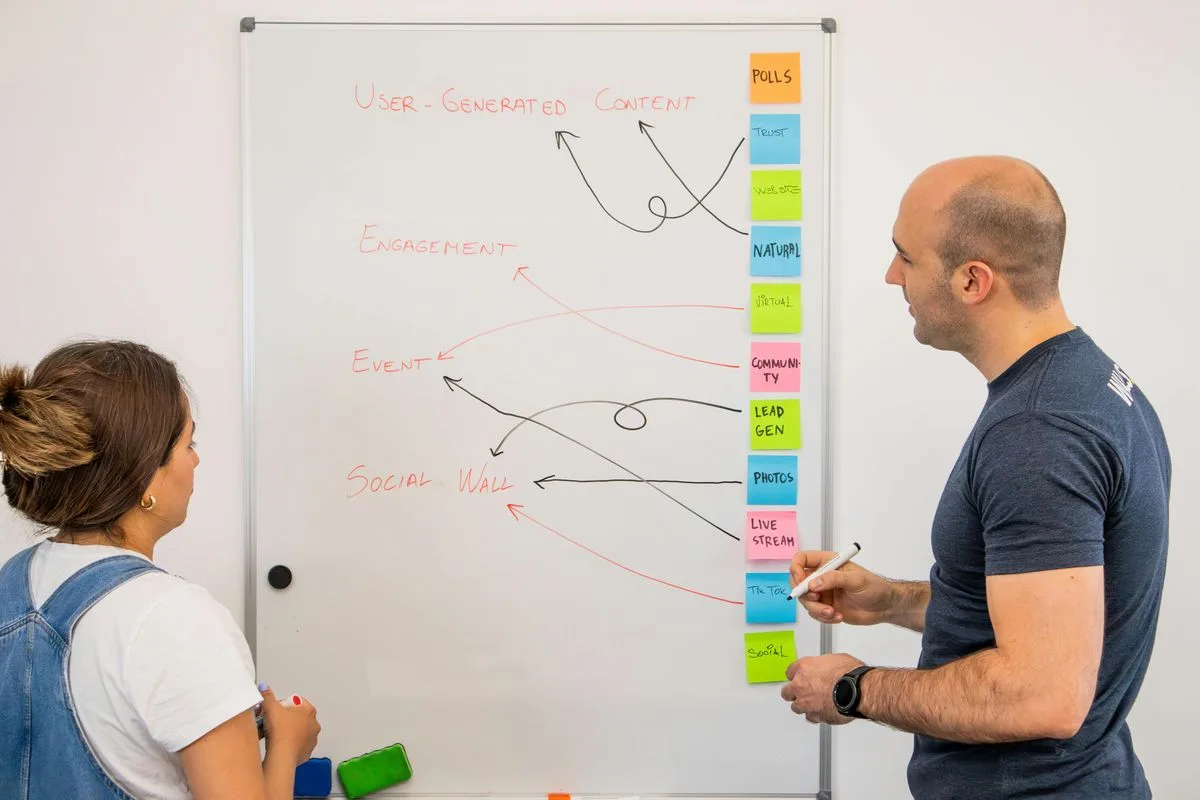Growleady Team
Lead Generation Experts
10 Effective B2B Strategies to Boost Your Business Growth
Explore B2B strategies for growth. Learn to engage clients, build relationships, and measure success with KPIs and ROI.

In today's rapid business world, understanding B2B strategies isn't just important—it's essential. Whether you're a seasoned entrepreneur or just starting out, these tactics can make or break your company's success. But what exactly are B2B strategies, and why should you care?
Understanding B2B Strategies

B2B strategies are essential for businesses looking to succeed in the complex world of inter-company transactions. These strategies encompass a range of approaches designed to help businesses effectively market and sell their products or services to other companies.
Defining B2B Marketing
B2B marketing focuses on promoting products or services to other businesses rather than individual consumers. It's a unique approach that requires a deep understanding of your target audience's needs, pain points, and decision-making processes. Unlike B2C marketing, B2B often involves:
Longer sales cycles
Multiple decision-makers
Higher-value transactions
More complex products or services
When crafting your B2B marketing strategy, it's crucial to speak the language of your potential clients. For example, instead of highlighting flashy features, focus on how your product or service can improve efficiency, reduce costs, or boost revenue for your target businesses.
A common misconception in B2B marketing is that it's all about cold, rational decision-making. In reality, emotions play a significant role in B2B purchases too. Building trust and relationships is just as important as showcasing your product's benefits.
The Importance of B2B Strategies in Modern Business
In today's rapid business environment, having a solid B2B strategy is more critical than ever. Here's why:
Targeted approach: B2B strategies help you focus your resources on the most promising leads, avoiding wasted effort on unqualified prospects.
Relationship building: Effective B2B strategies prioritize long-term relationships over quick sales, leading to more stable revenue streams.
Competitive advantage: A well-crafted B2B strategy helps you stand out in a crowded market, showcasing your unique value proposition.
Adaptability: Modern B2B strategies incorporate digital tools and data analytics, allowing you to quickly adapt to changing market conditions.
To incorporate these strategies into your business, start by thoroughly researching your target market. Identify key decision-makers within your target companies and tailor your messaging to address their specific needs and challenges.
One effective technique in B2B marketing is account-based marketing (ABM). This approach involves treating individual high-value accounts as markets of one, creating highly personalized campaigns for each. While ABM can be resource-intensive, it's particularly effective for businesses with high-value products or services.
When it comes to lead generation, many B2B marketers find success with LinkedIn outreach and cold email campaigns. But, it's crucial to avoid common pitfalls:
Don't be too salesy in your initial outreach
Personalize your messages beyond just using the recipient's name
Follow up consistently, but don't be pushy
Key Components of Effective B2B Strategies
Effective B2B strategies encompass various components that work together to drive business growth and foster strong relationships with other companies. Here are three key components that form the backbone of successful B2B strategies:
Account-Based Marketing (ABM)
Account-Based Marketing is a targeted approach that focuses on high-value accounts and personalized marketing efforts. It's like fishing with a spear instead of a net, aiming for specific big fish rather than casting a wide net and hoping for the best. Here's how ABM works:
Identify and prioritize key accounts based on their potential value to your business
Create tailored content and messaging for each account
Engage decision-makers and influencers within these accounts through multiple channels
Align sales and marketing teams to provide a unified approach
ABM enhances customer relationships, increases ROI, and improves collaboration between sales and marketing teams. By focusing your efforts on accounts with the highest potential, you're more likely to see significant returns on your investment.
Content Marketing for B2B
Content marketing is a powerful tool in the B2B space, helping you capture audience attention, establish thought leadership, and increase engagement. It's like planting seeds of knowledge that grow into trust and, eventually, business relationships. Here's how to make it work:
Create valuable, informative content that addresses your target audience's pain points
Develop content for different stages of the buyer's journey, from awareness to decision
Use a mix of content types, including blog posts, whitepapers, case studies, and videos
Optimize your content for both informational and conversion-focused keywords
Remember, B2B content marketing isn't about hard selling. It's about providing value, building trust, and positioning your company as an industry expert. This approach helps you attract and nurture leads over time, leading to more qualified prospects and higher conversion rates.
Digital Marketing Tactics
Digital marketing tactics are the tools you use to reach and engage your B2B audience in the online space. It's like having a toolkit full of different instruments, each designed for a specific purpose. Here are some effective digital marketing tactics for B2B:
Webinars: Host online seminars to showcase your expertise and engage with potential clients
Email marketing: Nurture leads and keep your audience informed with targeted email campaigns
Podcasts: Create audio content to reach busy professionals who prefer to consume information on-the-go
Social media marketing: Use platforms like LinkedIn to build relationships and share valuable content
Search engine optimization (SEO): Optimize your website and content to improve visibility in search results
Each of these tactics offers unique benefits and opportunities for engagement. The key is to choose the right mix of tactics that align with your target audience's preferences and behaviors. By leveraging these digital marketing tactics, you can create multiple touchpoints with potential clients, nurture relationships, and guide them through the buying process.
Integrating tools like Growleady can enhance these tactics by providing insights into lead behavior and optimizing your engagement strategies.
Building Strong B2B Relationships

Building strong B2B relationships is crucial for long-term success in the business world. By focusing on understanding your clients' needs and providing value, you'll create lasting partnerships that drive growth for both parties.
Networking and Partnerships
Networking and partnerships are essential components of B2B success. Here's how to excel in these areas:
Attend industry events: Trade shows, conferences, and seminars are prime opportunities to meet potential partners and clients. Come prepared with business cards and a concise elevator pitch.
Leverage LinkedIn: This professional network is a goldmine for B2B connections. Regularly share industry insights, engage with others' content, and join relevant groups to expand your reach.
Collaborate on content: Partner with complementary businesses to create webinars, whitepapers, or case studies. This exposes you to new audiences and establishes credibility.
Offer referral programs: Incentivize existing partners to introduce you to new prospects. A well-structured referral program can significantly expand your network.
Host networking events: Organize your own meetups or workshops. This positions you as an industry leader and facilitates valuable connections.
Customer Retention Strategies
Retaining existing customers is often more cost-effective than acquiring new ones. Here are strategies to keep your B2B clients loyal:
Carry out a customer success program: Assign dedicated managers to key accounts. They'll proactively address issues and ensure clients are getting maximum value from your products or services.
Personalize communication: Use CRM data to tailor your interactions. Acknowledge important dates like contract anniversaries or company milestones.
Provide ongoing education: Offer regular training sessions, webinars, or resources to help clients stay updated on your offerings and industry trends.
Seek and act on feedback: Regularly solicit client input through surveys or calls. More importantly, demonstrate how you're addressing their concerns.
Create a loyalty program: Offer exclusive benefits, early access to new features, or discounts for long-term clients. This incentivizes continued partnership.
Surprise and delight: Occasionally go above and beyond with unexpected perks or personalized gestures. This emotional connection can significantly boost loyalty.
By focusing on these networking, partnership, and retention strategies, you'll build a robust B2B ecosystem that fosters growth and long-term success. Remember, in B2B relationships, consistency and genuine value creation are key to standing out in a competitive world.
Leveraging Technology in B2B Strategies
Technology plays a crucial role in modern B2B strategies, enabling businesses to target customers effectively and streamline operations. By 2025, millennials will represent 75% of the global workforce, making it essential to adapt B2B marketing approaches to their preferences.
CRM Systems and Data Analytics
CRM systems and data analytics are game-changers in B2B strategies. They help you understand your customers better and make data-driven decisions. Here's how:
Customer Insights: CRM systems collect and analyze customer data, giving you a 360-degree view of your clients. This insight helps you tailor your approach to each client's needs.
Sales Forecasting: Data analytics tools can predict future sales trends, allowing you to adjust your strategies proactively.
Lead Scoring: CRM systems use data to score leads, helping you focus on the most promising prospects. This approach typically increases conversion rates by 20%.
Personalization: With data from CRM systems, you can personalize your marketing messages. Personalized emails have a 29% higher open rate and 41% higher click-through rate than generic ones.
Performance Tracking: Analytics tools help you measure the success of your campaigns, allowing you to refine your strategies for better results.
AI and Automation in B2B Marketing
AI and automation are revolutionizing B2B marketing, making processes more efficient and effective:
Chatbots: AI-powered chatbots can handle customer inquiries 24/7, improving response times and customer satisfaction. They can answer up to 80% of routine questions.
Predictive Analytics: AI algorithms can predict customer behavior, helping you target your marketing efforts more effectively. This can lead to a 20-30% increase in marketing ROI.
Content Creation: AI tools can generate personalized content at scale, ensuring each customer receives relevant information. This approach can increase engagement rates by up to 50%.
Lead Nurturing: Automated email sequences can nurture leads through the sales funnel, freeing up your sales team to focus on high-value tasks. Automated lead nurturing can increase qualified leads by 451%.
Account-Based Marketing: AI can identify ideal customer profiles and help you target specific accounts with personalized campaigns. ABM can increase deal size by 35%.
Remember, while technology is powerful, it's not a substitute for human interaction. Use these tools to enhance your B2B strategies, but don't forget the importance of personal relationships in B2B sales. The key is to find the right balance between technology and the human touch.
Measuring Success in B2B Strategies
Measuring success in B2B strategies is crucial for optimizing your marketing efforts and maximizing ROI. By tracking the right metrics, you'll gain valuable insights into your campaign performance and make data-driven decisions to improve your B2B marketing strategies.
Key Performance Indicators (KPIs)
When measuring B2B marketing success, focus on these essential KPIs:
Cost per Acquisition (CPA): Track how much you're spending to acquire each new customer. A lower CPA indicates more efficient marketing strategies.
Conversion Rates: Monitor the percentage of leads that become paying customers. Higher conversion rates suggest effective sales funneling and persuasive marketing tactics.
Customer Lifetime Value (CLV): Calculate the total revenue you can expect from a customer throughout your business relationship. A higher CLV justifies higher acquisition costs and indicates strong customer retention.
Lead Quality Score: Assign scores to leads based on their likelihood to convert. This helps prioritize high-potential prospects and allocate resources effectively.
Sales Cycle Length: Measure the time it takes to close a deal. Shorter sales cycles often indicate more efficient marketing and sales processes.
Website Traffic and Engagement: Track metrics like unique visitors, time on site, and bounce rates to gauge the effectiveness of your content and user experience.
Social Media Engagement: Monitor likes, shares, comments, and click-through rates on your social media posts to assess audience engagement and content relevance.
ROI Analysis for B2B Campaigns
Conducting a thorough ROI analysis helps you determine the profitability of your B2B marketing efforts:
Campaign-specific ROI: Calculate the return on investment for individual marketing campaigns. Use this formula: ROI = (Net Profit / Total Investment) x 100. A positive ROI indicates a successful campaign.
Attribution Modeling: Carry out multi-touch attribution models to understand which touchpoints in your marketing funnel contribute most to conversions. This helps allocate budget more effectively across channels.
Customer Acquisition Cost (CAC) vs. CLV: Compare your CAC to the CLV to ensure you're not overspending on acquisition. Aim for a CLV that's at least 3 times higher than your CAC for a healthy business model.
Revenue Growth: Track your overall revenue growth over time and correlate it with specific marketing initiatives to identify which strategies drive the most significant impact.
Marketing Qualified Leads (MQLs) to Sales Qualified Leads (SQLs) Ratio: Monitor the percentage of MQLs that convert to SQLs. A higher ratio indicates more effective lead nurturing and qualification processes.
Pipeline Velocity: Measure how quickly leads move through your sales pipeline. Faster velocity often correlates with more effective marketing and sales alignment.
Content Performance: Analyze which pieces of content generate the most leads, conversions, and revenue. This helps refine your content strategy and focus on high-performing topics and formats.
By consistently tracking these KPIs and conducting regular ROI analyses, you'll gain a comprehensive understanding of your B2B marketing performance. Use these insights to optimize your strategies, allocate resources more effectively, and eventually drive better results for your business.
Conclusion
B2B strategies are essential for business growth and success in today's competitive world. By implementing targeted approaches like Account-Based Marketing and leveraging digital tactics you can effectively engage your audience and build lasting relationships. Remember to focus on customer retention and measure your success through key metrics and ROI analysis. With a well-executed B2B strategy you'll be better equipped to navigate the complexities of the business world and drive sustainable growth for your company. Stay agile adapt to market changes and continually refine your approach to maximize your B2B success.
Frequently Asked Questions
What is Account-Based Marketing (ABM)?
Account-Based Marketing is a targeted B2B strategy that focuses on high-value accounts. It involves personalizing marketing efforts and sales approaches for specific companies or decision-makers. ABM aims to create tailored experiences, increase engagement, and improve conversion rates for key accounts.
How can content marketing benefit B2B businesses?
Content marketing helps B2B businesses establish authority, build trust, and educate potential clients. By creating valuable, relevant content, companies can attract and nurture leads throughout the sales funnel. This strategy enhances brand visibility, improves SEO, and provides resources that address customer pain points, ultimately driving conversions and fostering long-term relationships.
What are some effective digital marketing tactics for B2B?
Effective B2B digital marketing tactics include SEO optimization, targeted social media campaigns, email marketing, and pay-per-click advertising. Additionally, leveraging LinkedIn for professional networking, creating informative webinars, and utilizing marketing automation tools can significantly boost B2B marketing efforts. The key is to choose tactics that align with your target audience and business goals.
How can businesses build strong B2B relationships?
Building strong B2B relationships involves understanding client needs, providing excellent customer service, and maintaining open communication. Networking at industry events, offering valuable insights, and establishing partnerships can also strengthen connections. Consistently delivering on promises, being responsive, and demonstrating expertise in your field are crucial for fostering trust and long-term business relationships.
What strategies can improve customer retention in B2B?
To improve B2B customer retention, focus on delivering exceptional value, providing personalized experiences, and offering ongoing support. Implement a customer success program, gather and act on feedback, and create loyalty incentives. Regular check-ins, exclusive content or events, and proactive problem-solving can also help maintain strong relationships and reduce churn.
What are key performance indicators (KPIs) for B2B marketing?
Important KPIs for B2B marketing include Cost per Acquisition, Conversion Rates, Customer Lifetime Value, Lead Quality Score, and Sales Cycle Length. Other crucial metrics are Website Traffic, Social Media Engagement, and Return on Investment (ROI). Regularly tracking these KPIs helps businesses evaluate the effectiveness of their marketing strategies and make data-driven decisions for optimization.
How can businesses measure ROI in B2B marketing?
To measure ROI in B2B marketing, track total marketing spend against revenue generated from marketing efforts. Use attribution models to link sales to specific campaigns or channels. Calculate the lifetime value of customers acquired through marketing initiatives. Implement analytics tools to monitor conversions, and conduct regular performance reviews to assess the effectiveness of different strategies and adjust resource allocation accordingly.


